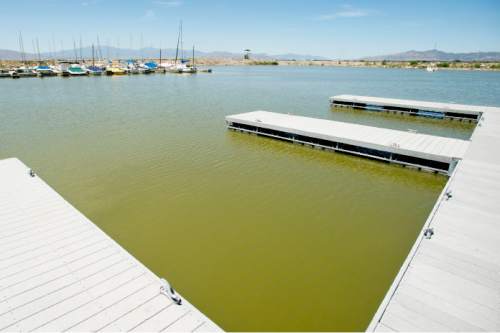This is an archived article that was published on sltrib.com in 2016, and information in the article may be outdated. It is provided only for personal research purposes and may not be reprinted.
A "landmark" bill to establish a scientific peer review process for rules and permits issued by the state's Division of Water Quality will soon be before the governor.
If Gov. Gary Herbert signs SB110 into law, Utah would be the third state — joining Minnesota and California — to pass legislation on scientific review of administrative lawmaking. But nothing in the nation comes close to the scope of this legislation, which would allow challenges of "pretty much any activity, rule, standard or initiative" from the Division of Water Quality or the Water Quality Board, said Walt Baker, DWQ director.
"We're breaking some ground here that has not been broken before," he said.
SB110 would allow stakeholders to pay to challenge the science behind water regulations proposed by the Division of Water Quality. A three-person panel made up of scientists selected by both the challenging party and the Division of Water Quality would then determine whether the action is scientifically defensible. If the panel deems that it isn't, the division may be unable to proceed with its rule.
Leland Myers, Central Davis Sewer District manager and the chief spokesman for the coalition of water managers who drafted the original bill, heralded the plan as one that would benefit citizens and make state regulators more thorough in their science.
"The biggest benefit is that it allows for a review and makes everyone a little more cautious to make sure they follow good science," he said. "I think the bar is set high enough that it won't be used frivolously."
To deter spurious challenges that could bog down rule-making, SB110 would require the challenging party to pay all expenses associated with the peer review — estimated in the range of $65,000 per year. That has drawn fire from detractors who say the purpose of the bill is to allow Utah industries to buy science and, by extension, exemptions from state and federal water-quality rules.
Patrick Shea, a professor of biology at the University of Utah and an independent attorney, said he worried SB110's specific brand of peer review would allow industry to engage in "dueling science," where experts are essentially hired to conduct research to contend against previous findings.
"It's ironic that in the state of Utah, where we think of government efficiency of being a prime virtue, that we then pass legislation that is inefficient and that in the long run, I believe, will be ineffective," he said.
The bill has also drawn criticism from the Environmental Protection Agency, which sent a letter to the state Division of Water Quality warning that the bill could cause the state to violate federal law.
Under the Clean Water Act, the EPA could require the state to revise the law or even revoke the state's authority to manage water quality independently.
Steve Erickson, a policy advocate for the Utah Audubon Council, said his group and a few others plan to petition the EPA to review the bill. The environmental groups have consistently opposed the bill, but didn't have the resources to slow its momentum, Erickson said.
"It was in the hands of the Legislature and the DWQ apparently felt comfortable with the changes, but we'll see if those are protective enough," he said. "The EPA will have to take a hard look at this. It's one of those bills that shouldn't have been done, probably."
SB110 passed the House on Tuesday after little debate, with a vote of 63-10. Signed by both the Senate president and House speaker, the bill was being reviewed by legislative counsel Wednesday.
Baker said the division hopes to address the EPA's concerns as it adapts to the requirements of SB110.
There are still some provisions of the bill that will have to be ironed out in an administrative rule-making process, or when the first challenge comes, he said, but there should be no disruption to the division's day-to-day operations.
"I think that we will be able to address any concerns or challenges that are brought before us," he said. "It just puts us on our toes a little more, knowing anything that we do will be scrutinized."
Twitter: @EmaPen



